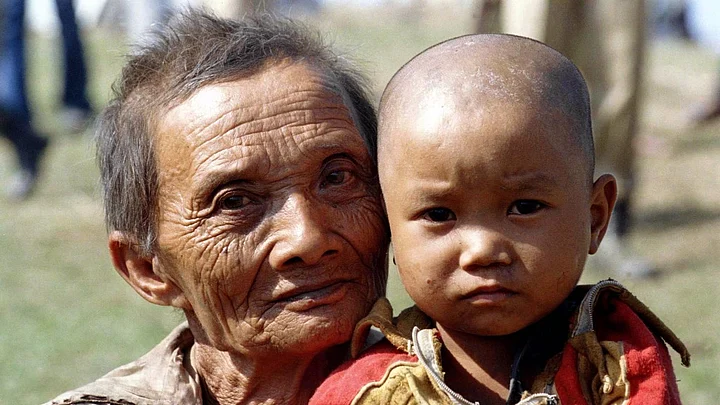Amidst the Rohingya refugee uproar, there are two other refugee groups in India's northeast region who have been fighting an endless crisis of identity.
Complying with the Supreme Court order of 2015, the Centre last week decided to grant "limited citizenship" to about one lakh Chakma and Hajong refugees living in Arunachal Pradesh. The decision was taken under the Narendra Modi government's Citizenship (Amendment) Bill, 2016, that proposed to make illegal non-Muslim migrants – including Hindus, Sikhs, Buddhists and Christians – eligible for citizenship.
In the meantime, Arunachal Pradesh has been burning with protests, as the tribals fear the refugees would outnumber them.
Just a week later, on 19 September, Union Minister of State Kiren Rijiju took an about-turn, saying the SC’s 2015 order was “unimplementable”.
Lost between lands, let us understand the 60-year-long struggle of the Chakma and Hijong refugees in the eastern parts of India.
Who Are Chakmas and Hajongs?
Chakmas and Hajongs were originally inhabitants of the Chittagong Hill Tracts of ertswhile East Pakistan (now Bangladesh). They had to flee in 1963-64 when their land was submerged by the Kaptai dam built on the Karnaphuli river in the Hill Tracts. Chakmas are predominantly Buddhists, while Hajongs are Hindus as a result of which they faced religious persecution in Bangladesh and decided to seek asylum in India. They entered India through what was then called the Lushai Hills district of Assam (today's Mizoram) where the Indian government had set up refugee camps. While some stayed back with the Chakmas of the Indian-origin already living in the Lushai hills, the others were moved to Arunachal Pradesh by the then ruling Congress government post the Sino-Indian War of 1962.
What Happened After 1962 Sino-Indian War?
The 1962 Indo-China War had exposed the vulnerabilities of an unguarded border and vacant lands in the north-east boundaries of our country. To curb the threat of foreign attacks in future, PN Luthra, advisor to the Assam governor, in 1965, wrote to political officers of the North East Frontier Agency (NEFA), the administrator of this region prior to the creation of Arunachal Pradesh:
Resettlement of people in the vacant border areas will help to strengthen our frontiers and their defence... Reports show there are certain areas with vacant land on which there is no direct individuals or claim ownership.
According to a joint statement by the Prime Ministers of India and Bangladesh in 1972, the Chakmas and the Hajongs have been granted citizenship under Section 5(i)(a) of the Citizenship Act. However, after the birth of Arunachal Pradesh in 1987, immediately identified the Chaknas and the Hajongs as potential threat to their demographic balance.
No Land for the Homeless
Although the strategy worked fine till 1980s, a crisis for identity and insecurity of an imbalance of power emerged from the neighbouring states. From "Go back Chakmas" slogans to burning houses, the anti-immigrant stir became a huge threat to the peace in the hills.
- 1991 – Chakmas, Hajongs and Tibetans stopped receiving food subsidy by a state order. Conferment of Citizenship Rights to Chakmas and Hajongs, whose petition made SC rule in favour of the Chakmas in 2015, took the help of National Human Rights Commission
- 1996 – The SC ordered the state “to protect lives and properties of Chakmas.”
After the SC order, the unrest subsided, but the Chakmas and the Hajongs remained stranded without voting rights and state benefits.
Is Arunachal Ready to Accept Them Now?
Even in 2017, two decades later, the tribals of Arunachal Pradesh are not ready to accept the Chakmas and the Hajongs as permanent residents of the place. Arunachal Pradesh has been burning with protests. The state was shut down from dawn to dusk after AAPSU called for a strike against the Centre's move. Violence erupted in the region with cars and other vehicles being set ablaze – and a complete shutdown of the state for 12 hours.
The Decision Now: Are Chakmas and Hajongs Indian Citizens?
Several parties are unhappy with the Centre’s decision taken in the meeting convened by Home Minister Rajnath Singh last week with the Arunachal Pradesh CM Pema Khandu, Union Minister Kiren Rijiju and National Security adviser Ajit Doval.
Citing reasons of demographic concerns and violation of Bengal Eastern Frontier Regulation of 1873, Rijiju, who hails from Arunachal Pradesh said it will move the apex court for a modification in the order. Chief Minister Pema Khandu has also written to Home Minister Rajnath Singh expressing his concerns against the Centre's move stating that his state is not ready to accept any infringement on the rights given to the tribals.
The people of my state want to ensure that the ethnic composition and the special rights enjoyed by the tribes of Arunachal Pradesh are safeguarded at all cost.Khandu to Rajnath Singh
The crisis of Chakma and Hajong refugees remain a story of struggle for identity, land and right to citizenship.
